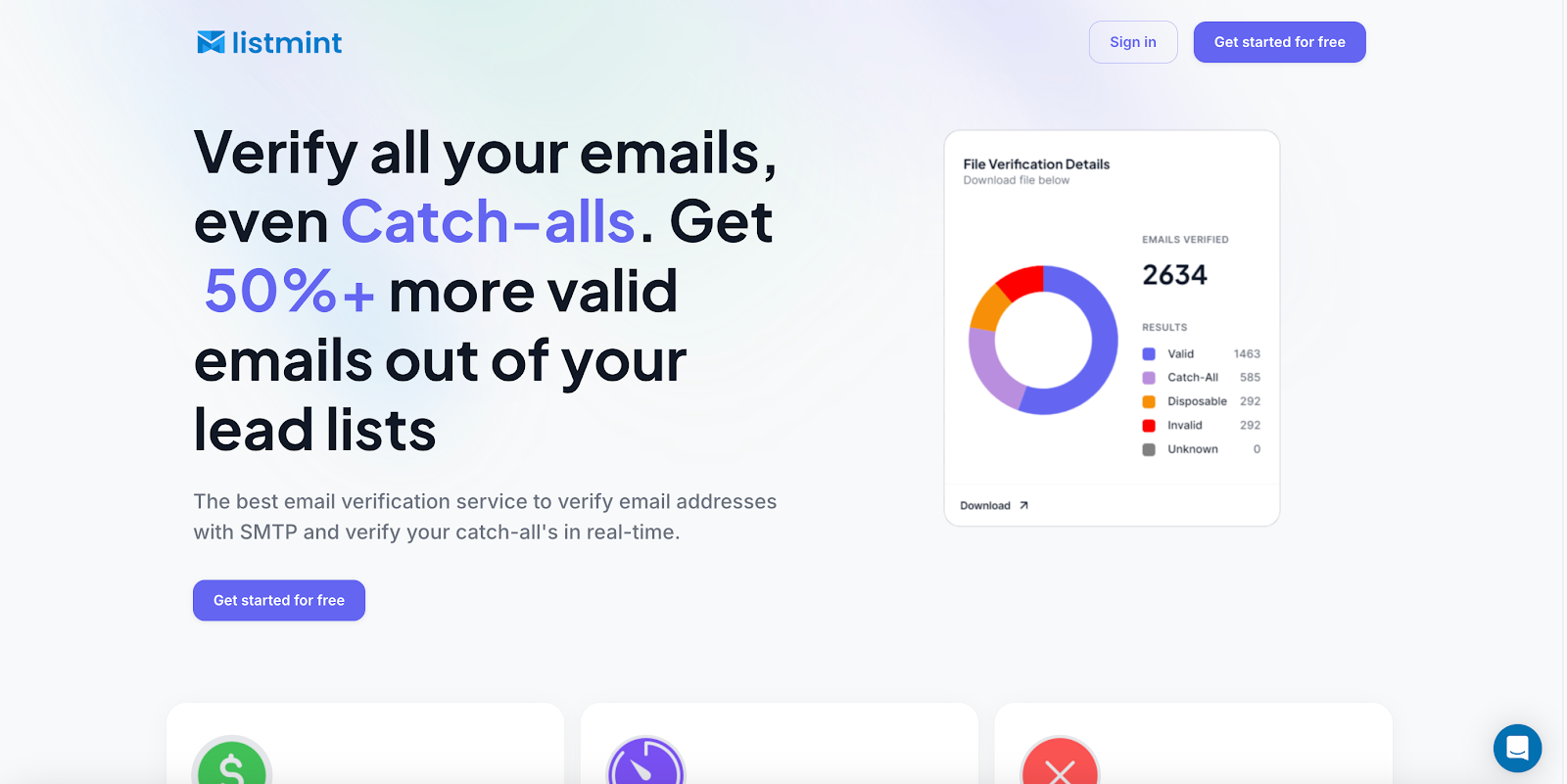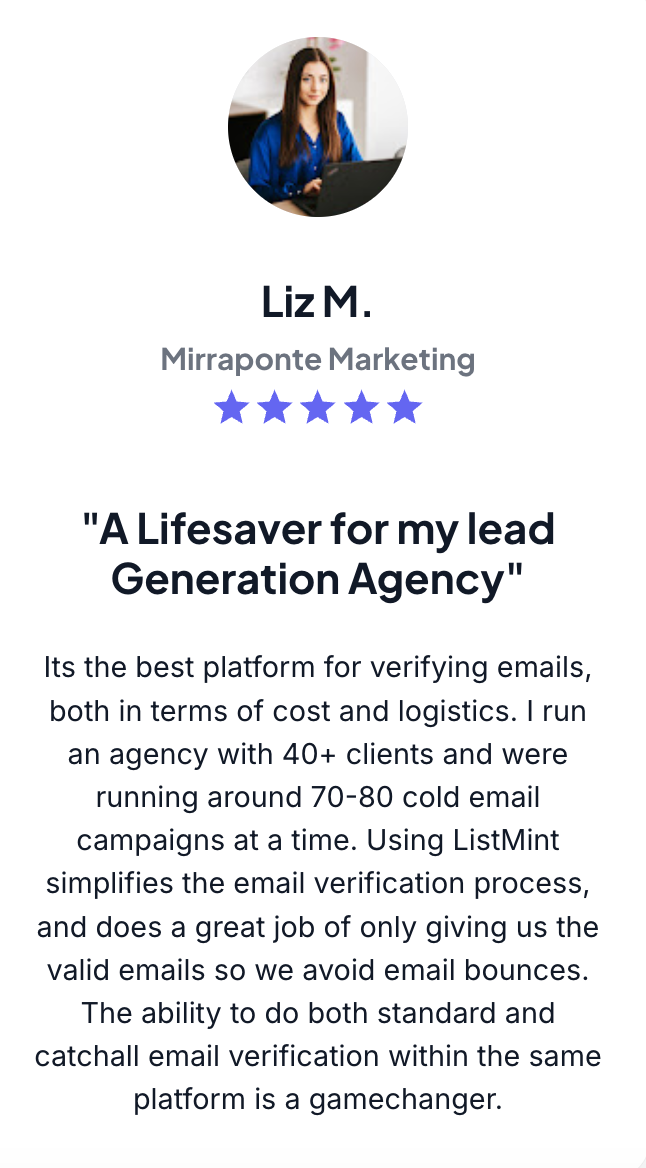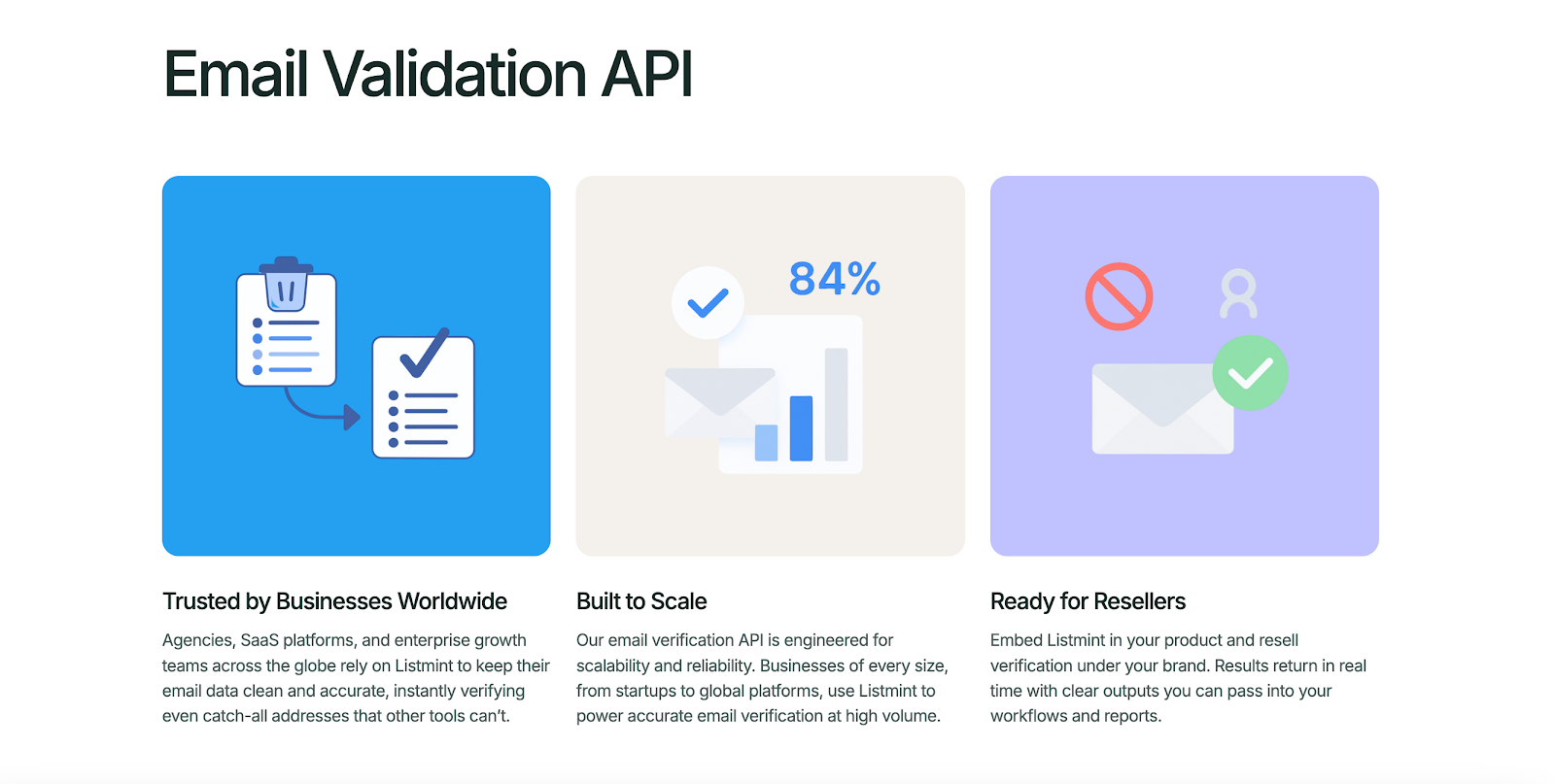
Email communication remains one of the strongest channels for building customer relationships and driving growth. But every campaign depends on the quality of the email addresses you collect.
If the data is inaccurate, messages bounce, sender reputation suffers, and valuable opportunities slip away.
This is where an email validation API makes a difference. It works quietly in the background, checking addresses the moment they enter your system, so you know you’re working with real, deliverable contacts.
Instead of dealing with wasted sends or compliance risks later, businesses get clean, reliable data from the start.
In this guide, you’ll learn what an email verification API is, why companies depend on it, how it works, and the features that set the best solutions apart.
An email verification API is a tool that checks the validity of an email address the moment it enters your system.
It confirms whether an address is formatted correctly, tied to an active domain, and capable of receiving messages. That means fewer wasted sends and stronger campaign performance.
Unlike manual checks or one-off tools, an API integrates directly into existing platforms such as web forms, CRMs, or landing pages. Each address is reviewed in real time, helping teams catch typos, non-existent accounts, and undeliverable emails before they create problems.
Accuracy and speed are at the core of every verification API. With the right setup, companies can validate email addresses at scale and maintain a clean email list without adding extra steps for their teams or users.
Keeping complaint rates low protects sender reputation and inbox placement. Since February 2024, Gmail requires bulk senders to stay below a 0.3% spam complaint rate, alongside authentication and one-click unsubscribe.
An email verification API helps by removing invalid, risky, and mistyped addresses before they cause performance issues.
It also cuts wasted spend by cleaning lists in advance of campaigns. Instead of paying to send to undeliverable addresses, messages go to real recipients who can engage with the content.
Even modest improvements in list quality can add up to meaningful savings over time, while also keeping databases clean for future campaigns.
Beyond financial benefits, a verification API reduces compliance risks. By identifying disposable email addresses, spam traps, and other risky entries, businesses avoid sending to invalid or malicious contacts.
That helps keep deliverability healthy and gives campaigns the best chance of reaching the inbox.
An email verification API runs behind the scenes to confirm if an address can reliably receive email messages. Each request runs through a series of checks that happen in seconds, protecting the sender's reputation and keeping databases clean.
Here’s the typical workflow:
Real-time email verification works best for capturing clean addresses as users type them in. For larger campaigns, batch verification makes it possible to validate entire email lists before sending.
Both methods help reduce bounce rates, avoid spam traps, and remove undeliverable emails before they damage deliverability.
Choosing the right verification API goes beyond basic syntax checks. The best solutions give teams accuracy at scale, easy integration, and the security needed to handle sensitive data.
Here are the features that matter most:
An effective validation API not only helps prevent typos and keep data clean, but it also supports stronger deliverability across mailbox providers like Gmail and Yahoo.
Listmint solves the hardest challenge in email verification as it instantly validates catch-all emails that most platforms disregard as risky or unusable.

Many providers take hours or even days to return catch-all results, often after sending test messages. Listmint returns results instantly without sending an email.
That speed and accuracy have powered over 1B+ emails verified with 99%+ results across both SMTP and catch-all checks.
Businesses and agencies benefit directly from this precision. Competitors often report about ~55% validity on catch-all leads; internal Listmint benchmarks and customer feedback show ~84% valid, helping teams recover 50%+ more usable emails.
Agencies, SaaS platforms, and enterprise teams rely on the platform across CRMs, sign-up forms, and bulk uploads, recovering more than 50% additional valid emails out of the same lists.
Key features include:
Marketers and agencies consistently report strong results with Listmint:

⭐⭐⭐⭐⭐
“The fastest, easiest, and most effective validation tool.”
Matt Lucero, Founder, Anevo Marketing

⭐⭐⭐⭐⭐
“Verifies standard and catch-all emails in one spot with a less than 1% bounce rate.”
Jack M., Founder, Centauri Marketing

⭐⭐⭐⭐⭐
“We run 70–80 cold email campaigns at a time, and Listmint is a lifesaver for verifying data.”
Liz M., Mirraponte Marketing
For teams that want reliable data without wasted leads, Listmint stands out as the most accurate and scalable solution available. With a 99%+ accuracy in catch-all verification, businesses gain access to contacts that other platforms discard while still protecting the sender's reputation.

Accurate data is the foundation of successful email campaigns. An email verification API makes that possible by validating every address in real time, protecting sender reputation, and reducing wasted spend on undeliverable messages.
Clean lists mean stronger deliverability, more engagement, and better long-term results for any business that relies on email.
Listmint stands out by verifying standard and catch-all addresses instantly with 99%+ accuracy. That advantage turns lost contacts into real opportunities, helping teams get over 50% more valid leads out of the lists they already own.
With proven scalability, a user-friendly dashboard, and secure architecture, Listmint gives businesses and developers a platform they can rely on at any stage of growth.
Get started for free and see how accurate verification turns data into growth.
An email validation API checks if an address is valid, active, and able to receive email messages. It reviews syntax, domain, MX records, and mailbox status to identify invalid or false entries.
Using a trusted email validator like Listmint helps teams verify email addresses in real time, keeping databases accurate and ready for sending emails.
Yes, an email api can process single addresses or entire lists through bulk email verification. This allows teams to verify lists before campaigns go out, removing invalid contacts and reducing bounce rates.
Tools such as Listmint support both real-time checks and batch processing for larger files, ensuring lists are clean and reliable.
Integration is done by connecting the api to your website forms, CRM, or custom platform. Developers can use clear documentation and logs to set up the connection, making it possible to prevent typos and identify risky addresses at the point of entry.
Listmint’s email verification API is designed for quick integration and has scalable options for startups and enterprise teams.
Yes, a verification api automatically detects undeliverable or non-existent accounts, so businesses can focus on valid contacts. Removing invalid data keeps lists accurate, prevents wasted effort, and improves deliverability.
Even free test accounts can help companies see how an api works before scaling up to larger campaigns.
Yes, an email verification API can be integrated using PHP to process verification requests directly from your website or platform. Developers often use PHP scripts to send API requests, log responses, and handle results in real time.
This setup makes it possible to validate email addresses as users submit forms, ensuring only valid contacts enter your database.
Verify all your emails, even Catch-alls in real-time with our Email Verification Software.
Create an account for free.